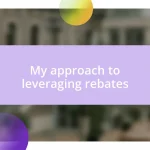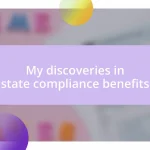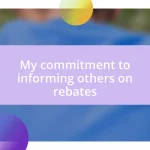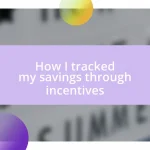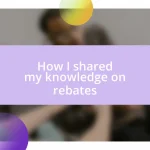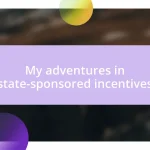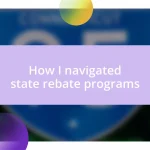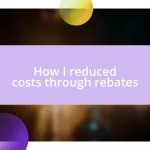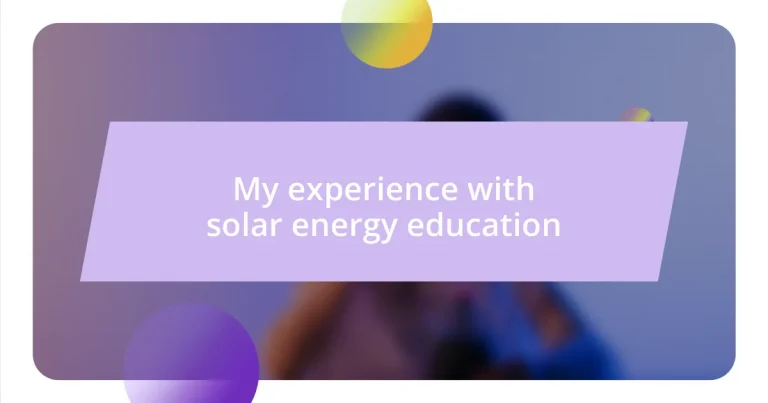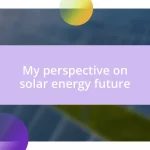Key takeaways:
- Embarking on solar energy education transformed the author’s understanding of renewable energy, emphasizing the significance of informed decisions and community involvement.
- Hands-on experiences, such as volunteering for installations and participating in workshops, fostered a deep connection to the practical impact of solar energy on individuals and communities.
- The future of solar education is poised for growth through innovative solutions, hands-on learning, and collaboration between educational institutions and industry leaders, preparing upcoming generations for a sustainable future.
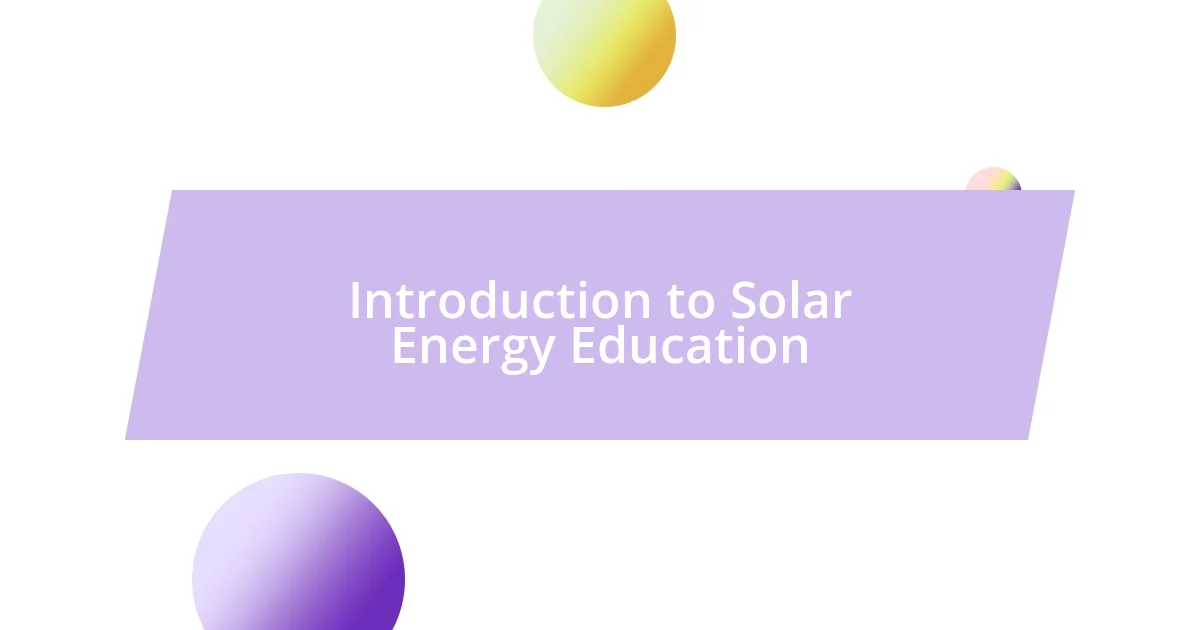
Introduction to Solar Energy Education
Diving into solar energy education was one of the most enlightening experiences of my life. It opened my eyes to not only the technology behind solar systems but also the broader implications for our planet. Have you ever thought about how much energy we waste daily? I certainly hadn’t until I started exploring this topic, and it spurred a sense of responsibility within me.
Initially, I thought the technical aspects of solar energy would be daunting, but I soon discovered it was more accessible than I imagined. Learning about photovoltaic cells and how sunlight is converted into electricity felt like uncovering a secret that could help us combat climate change. Can you picture a world where clean energy powers our homes? That vision fueled my curiosity even further and made me excited to grasp the intricacies of solar technology.
As I immersed myself in solar energy education, I was struck by its potential to transform communities. Witnessing programs that teach kids about renewable energy during school field trips reminded me of my own fascination as a child, marveling at how things worked. This connection to personal experiences made the knowledge more tangible and reinforced my belief that education is key to fostering a sustainable future.
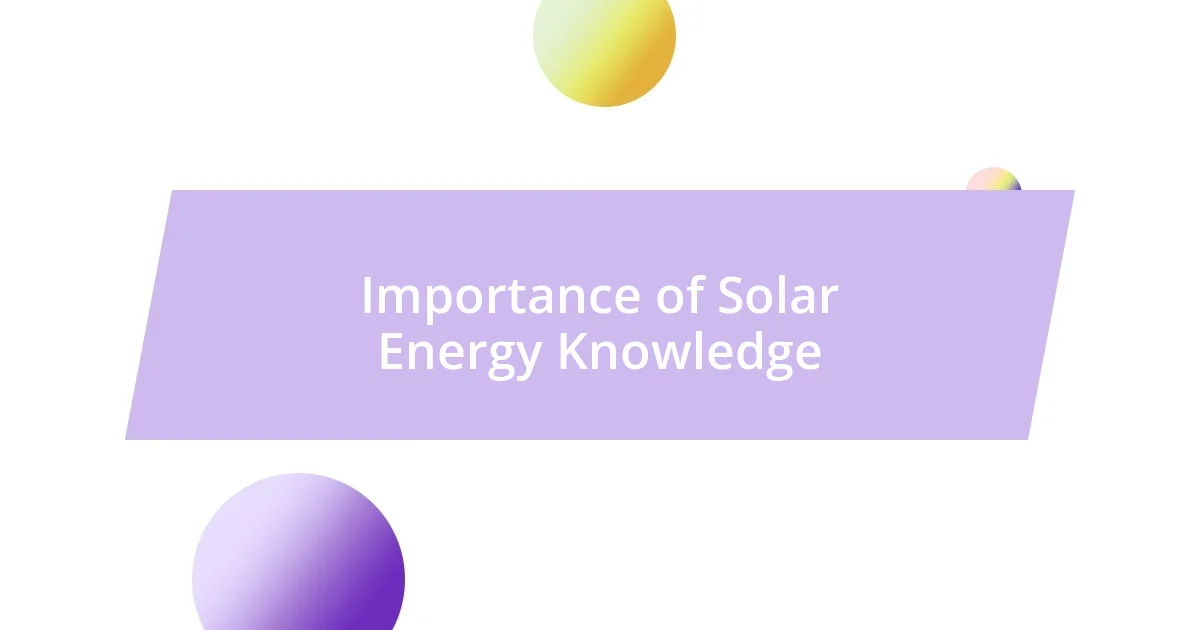
Importance of Solar Energy Knowledge
Understanding solar energy isn’t just an academic exercise; it’s about grasping the impact we can make on our environment. When I started to really dig into the principles of solar energy, I found that this knowledge empowers me to make informed decisions in my daily life. For example, last summer, I installed solar panels on my roof, which led to a significant drop in my electric bill and a heartfelt sense of pride knowing I’m contributing to a cleaner world.
Here’s why having knowledge of solar energy is so vital:
- Environmental Empowerment: Understanding solar energy helps us appreciate its role in reducing carbon footprints.
- Informed Decisions: Knowledge enables us to choose sustainable options when considering energy sources for our homes and businesses.
- Economic Advantages: Educating ourselves about solar incentives, rebates, and savings can lead to financial benefits.
- Community Awareness: Awareness fosters community action, inspiring collective efforts to embrace renewable energy solutions.
- Career Opportunities: As the solar industry expands, knowledge opens doors to various career paths in renewable energy.
When we share this knowledge, it creates a ripple effect, encouraging more people to explore and adopt solar solutions in their lives. I vividly recall sharing my solar journey with friends, and seeing their interest spark was incredibly fulfilling. It served as a reminder that education is contagious, and it’s our responsibility to spread the word.
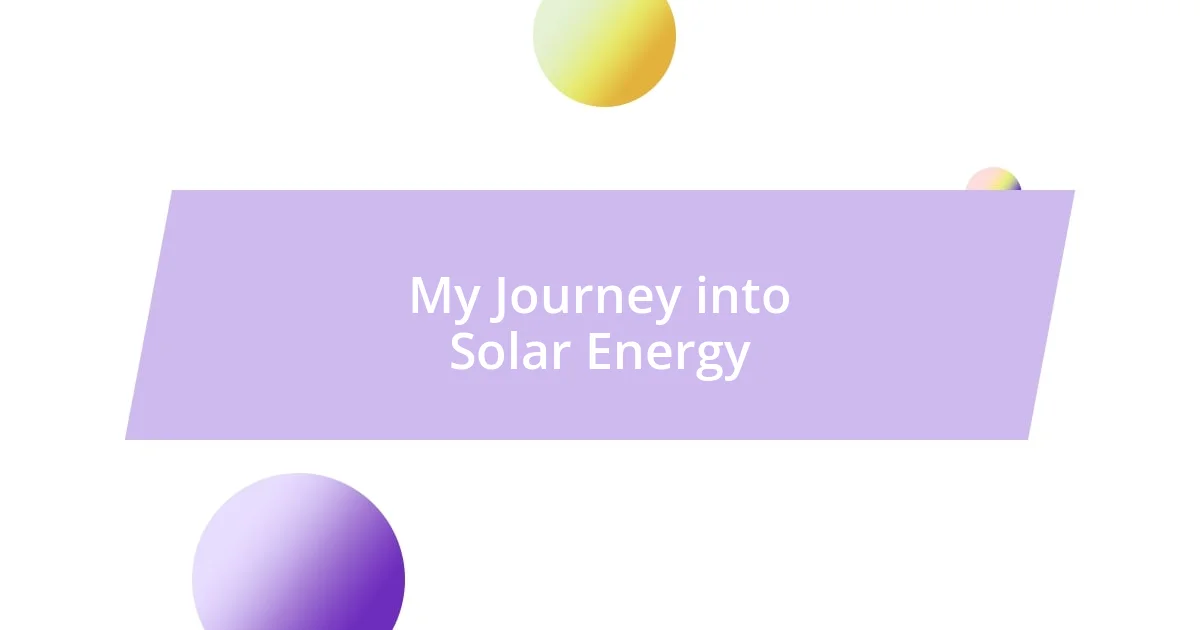
My Journey into Solar Energy
My journey into solar energy began unexpectedly at a local community event. I remember watching a documentary that showcased families who had transitioned to solar power. Their stories were so inspiring that I felt an immediate urge to learn more. It was like a light bulb moment for me—seeing how one decision could shift not just their energy bills but also their entire lifestyle. I knew then that this wasn’t just a trend; it was a movement I wanted to be part of.
As I dove deeper into the world of solar energy, I came across a workshop hosted by local experts. I eagerly signed up, not really knowing what to expect. To my surprise, it wasn’t overly technical; instead, they broke down complex ideas into digestible content. I vividly recall a woman sharing her experience of installing solar panels on her home and how it changed her relationship with energy consumption. Listening to her, I felt a sense of community and a growing passion in me to join the ranks of those making eco-friendly choices.
On my path, I also realized the importance of hands-on experience. I volunteered with an organization that installs solar panels in underprivileged areas. It was rewarding to witness the joy on families’ faces as they received their new systems. That was when I truly understood the impact of solar energy beyond just savings—it’s about empowerment and transformation. Being part of that change motivated me to keep learning and to advocate for solar energy more fiercely.
| Key Experiences | Insights Gained |
|---|---|
| Attending a community documentary screening | Awareness of the impact of solar on family lifestyles |
| Participating in a solar workshop | Complex concepts made accessible and relatable |
| Volunteering for solar installation | The transformative power of solar energy in communities |
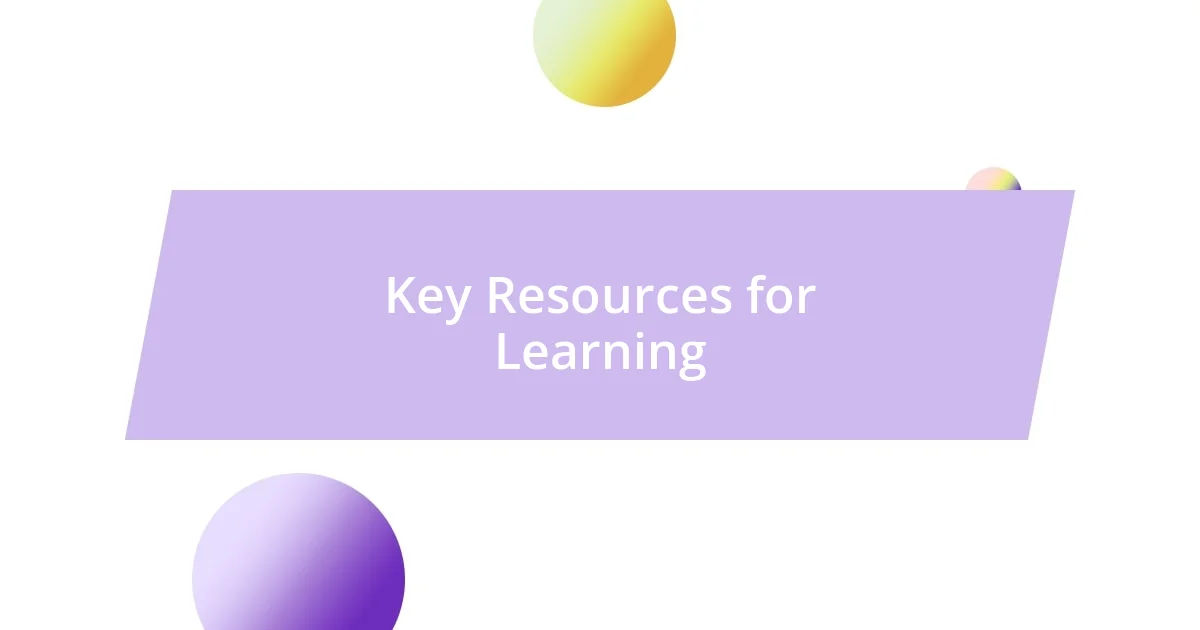
Key Resources for Learning
I found an incredible wealth of resources while learning about solar energy, and they truly transformed my understanding. Online platforms like Coursera and edX offer comprehensive courses on solar technology, often crafted by reputable universities. I remember taking a course that dissected everything from photovoltaic systems to energy storage. The material was engaging, and I left each module feeling more equipped to discuss solar energy intelligently.
Another invaluable resource for me was joining local solar-focused community groups on social media. These platforms became gold mines for both information and support. I recall a particularly enlightening discussion thread where members shared their experiences with different solar products. It was fascinating to see real people debating their choices and the resulting benefits—it felt like a window into the collective learning of those invested in renewable energy.
Furthermore, I recommend checking out podcasts dedicated to solar and sustainability topics. I frequently listened to episodes while commuting, which made it easy to integrate learning into my routine. One episode that stuck with me featured an expert discussing the latest advancements in solar technology and their implications for homeowners. I often found myself nodding along, thinking, “I want to be part of this future.” It’s these real conversations that helped me understand the big picture while also feeling connected to a broader community.
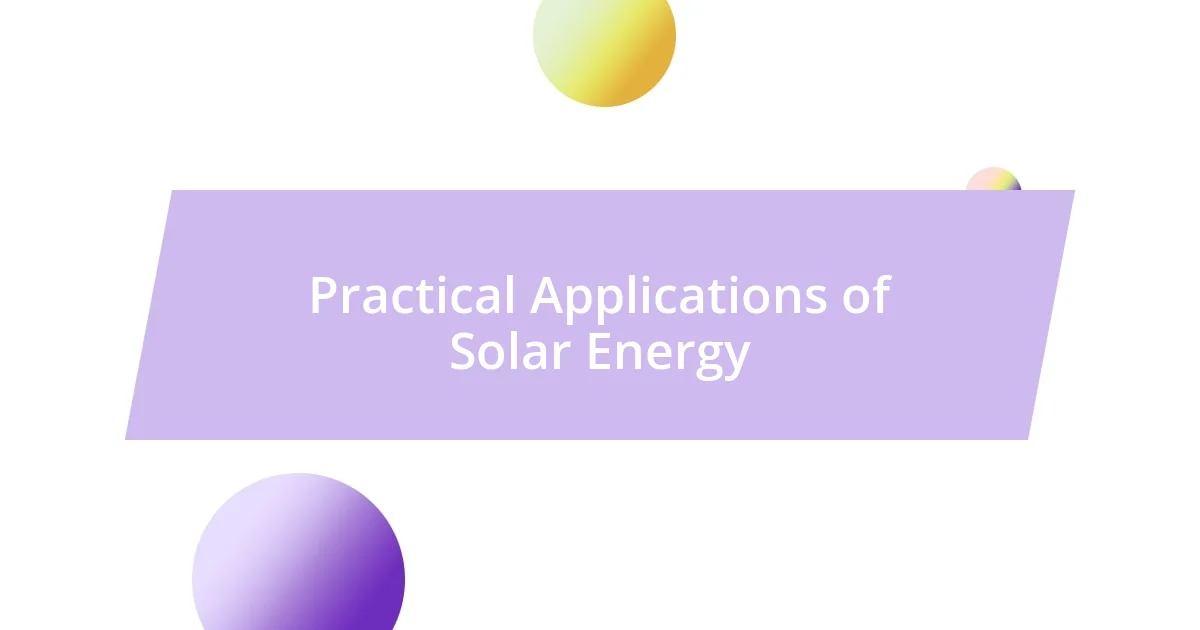
Practical Applications of Solar Energy
I’ve seen solar energy truly shine in its practical applications. One standout moment was when I helped a neighbor install solar panels on their roof. The excitement in their eyes, watching how their energy meter spun backward, was priceless. It made me realize that solar isn’t merely about reducing bills; it’s about enhancing lives. How profound is that transformation—changing not just energy sources but the very essence of how families interact with their environment?
Solar energy can also power community initiatives in incredible ways. I remember collaborating with a local school to set up a solar-powered irrigation system for their garden. The teachers were thrilled not only for the sustainability aspect but also because it provided valuable lessons for students about renewable energy. It’s fascinating to think that children are learning about environmental stewardship hands-on. Could there be a better way to nurture future generations?
Beyond residential installations and educational projects, solar energy fuels significant businesses too. I once visited a local company that harnesses solar panels to run their operations, cutting down their carbon footprint while keeping operational costs low. Witnessing their commitment to sustainability inspired me deeply. Isn’t it uplifting to see businesses lead the charge toward a greener future? The practicality of solar energy spans countless facets of our daily lives, making it clear that we’re only scratching the surface of what it can achieve.
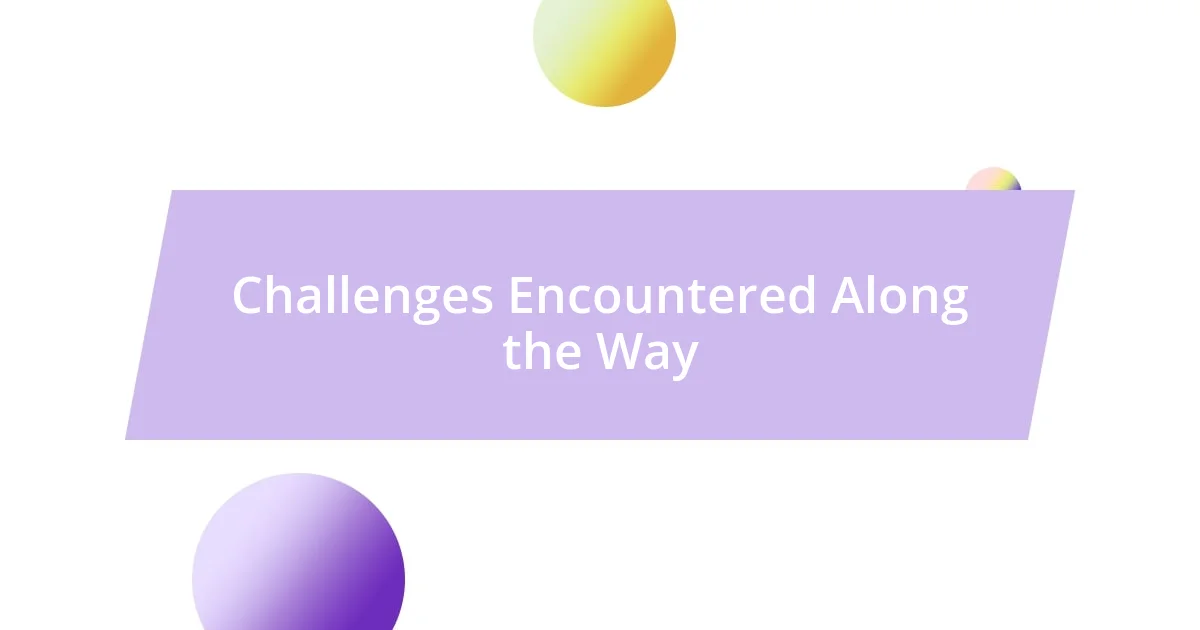
Challenges Encountered Along the Way
One significant challenge that surfaced during my solar energy education journey was the complexity of the technical jargon. At first, terms like “inverters,” “photovoltaic cells,” and “net metering” felt like a foreign language. I vividly recall poring over a textbook, feeling overwhelmed and wondering if I’d ever grasp these concepts. It’s crucial to remember that feeling lost is part of the learning process. I found that breaking down these terms into simpler language and seeking explanations from peers made all the difference.
Another hurdle came from the sheer volume of information available. I found myself diving into articles, videos, and discussions, only to feel like I was barely skimming the surface. It was intimidating to separate fact from opinion and determine what was essential. I learned to navigate this maze by focusing on credible sources and aligning my learning with specific goals, which turned out to be a game changer. Have you ever felt stuck in an information overload? I learned that taking breaks and allowing myself to reflect on what I had absorbed was just as valuable as the studying itself.
Then there were the moments of skepticism from friends and family. Some doubted the practicality of solar energy, questioning its viability and cost-effectiveness. I distinctly remember a family dinner where my passion for solar faced skepticism, which left me feeling frustrated and defensive. But rather than argue, I took it as a chance to share my knowledge and personal experiences. This not only strengthened my understanding but also created engaging conversations around renewable energy. Isn’t it amazing how challenges can spark dialogue and growth? Embracing these interactions helped me refine my views and present arguments with more confidence.
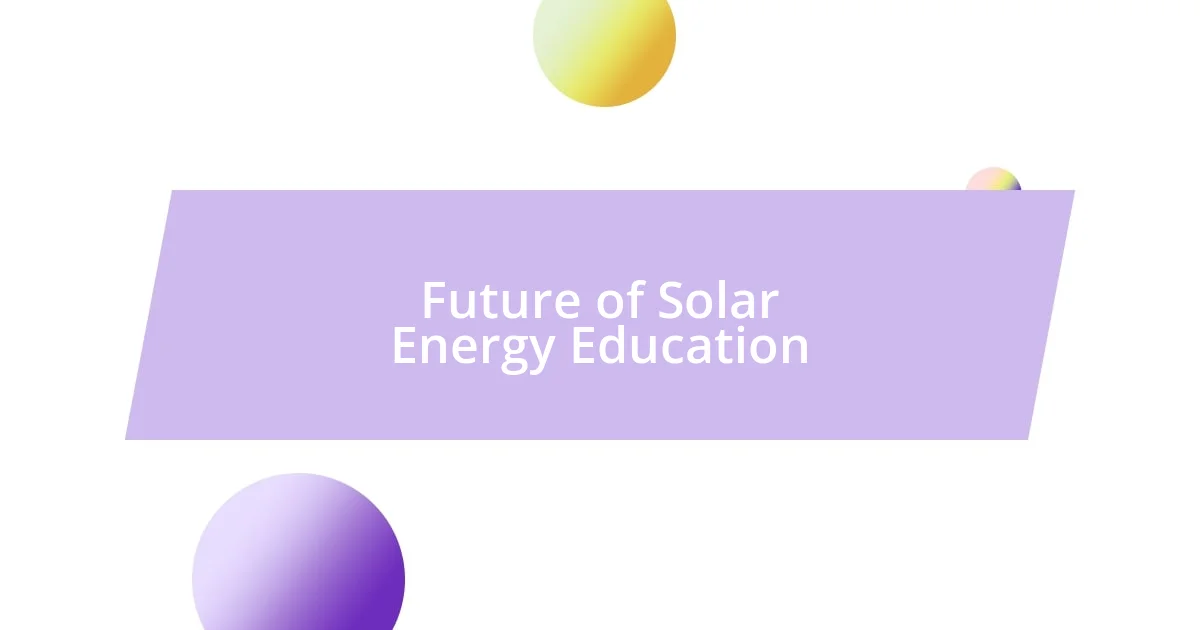
Future of Solar Energy Education
I believe the future of solar energy education holds immense potential, especially as the technology evolves. I recall a workshop I attended in which the facilitator showcased innovative solar solutions, like building-integrated photovoltaics. It was exciting to see how the integration of solar technology into everyday structures could transform our environments. Aren’t we at the cusp of a design revolution that blends functionality with sustainability?
Moreover, I envision a shift toward more hands-on learning experiences. For instance, I participated in a community-driven project where we converted a school bus into a mobile solar education unit. This real-world application allowed participants to engage directly with solar technology—grasping concepts while installing systems and troubleshooting issues. I felt a surge of joy as we witnessed students’ faces light up when they realized they could create energy from the sun. Isn’t it rewarding to inspire curiosity?
Lastly, an essential component I see for the future is collaboration between educational institutions and industry leaders. I had the opportunity to attend a summit where educators and solar companies brainstormed how to develop curricula that reflect market needs. It struck me how vital this relationship is in equipping learners with practical skills. How else can we prepare the next generation of solar engineers and advocates? By fostering these connections, we ensure a workforce ready to tackle tomorrow’s challenges in renewable energy.

